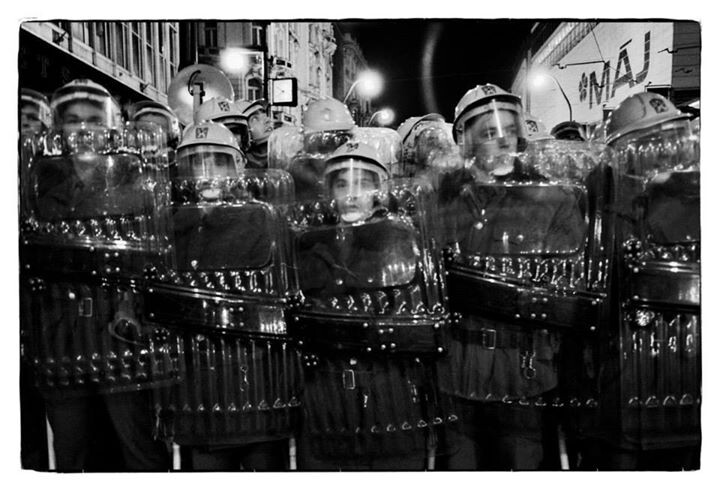
It was a long, complicated battle to topple communism in Europe, but for many, a succession of events in the fall of 1989 were the dominoes, falling ever faster toward dismantling the Iron Curtain of Soviet rule.
Hana Waisserova, assistant professor of practice in modern languages and literatures, was in her third year of high school in what is now the Czech Republic and remembers the events of 1989 very well.
“There’s an old anecdote that in Poland, it took nine years. In Germany, it took nine months, but in Czechoslovakia, it was nine days,” Waisserova said. “It was really exciting.”
Waisserova, along with three additional Husker faculty members, will share their recollections of this tumultuous time during a special Global Café panel, “Witnessing 1989 Revolutions: 30th Anniversary of the Fall of Communism in Europe.” The event, which is free and open to the public, is Nov. 6, 3:30 to 5 p.m., in the University Suites Multipurpose Room, 1780 R St.
Panel participants are Roland Végső, Susan Rosowski associate professor and vice-chair of English, on Hungary; Alexander Vazansky, assistant professor of history, on Germany; Emira Ibrahimpasic, assistant professor of practice and assistant director of global studies, on former Yugoslavia; and Waisserova on the former Czechoslovakia.
Waisserova, who helped organize the event, said the date was chosen because it is near the 30th anniversary of the fall of the Berlin Wall on Nov. 9, 1989, which for many is the physical manifestation of the end of Soviet rule in eastern Europe.
“It was important for Germany, but for us (in Czechoslovakia) as well,” Waissarova said. “I went there right away. I still have a piece of the wall at home.
“We had to be there because for us, it was very symbolic. I remember it very vividly because it was a symbol that things were happening.”
Soon after, Waisserova and her family watched the Velvet Revolution unfold quickly when Soviet police violently cracked down on student demonstrations in Prague on International Students Day, Nov. 17, 1989.
“That whole year, things had already been sort of boiling with brutally suppressed protests in January, but the special forces attack on students on Nov. 17 was an awakening moment for the public and what followed was a very quick transformation of power,” she said. “It was a great atmosphere – people gathered, there was a lot of excitement, music, talks and great expectations in the air. I have a lot of memories from my high school as some teachers did not believe it would go through and were afraid, while others joined the newly formed civic platforms and became immediately engaged with us who were taking part. Actors, students, singers, writers and activists came to my town and gave speeches – it was truly exciting.
“My brother had been associated with the underground press, so soon after we went to Prague and we helped deliver newly published books, which could not be published officially before, and we brought them to bookstores. Books were always very important to all of us, and Czechs and Central Europeans have always been huge readers. Imagine how much stuff could not be published over 40 years, and it was coming out then. Soon after, many of us started travelling abroad as backpackers as the border suddenly opened, and we felt a physical need to cross the borders. Soon many previously banned people finally rejoined the professions they studied, new exchanges and scholarships started, and society was opening up very quickly.”
Waisserova is happy to share her insights with students as there are personal and political lessons to be learned from the rise and fall of communism.
“Historically, whenever some sort of totalitarianism appeared in Europe, and it had rhetoric with quick fixes, people were cheering for it because hardly anyone could foresee what it would do, and some would sober up too late,” she said. “Though the regimes of the Soviet buffer zone were mostly on their last breath, people were still beaten, locked up and sprayed with water cannons.
“Underground intellectuals did a lot of work to undermine the regime and point at its violations of human rights, but it needed some energy to tip the scales – and that was provided by students. I think that events such as the Velvet Revolution and the fall of the wall are great examples showing that students who care can make a real difference and trigger huge social changes. There have been many points in history changed by the actions of young people.”
Global Café is hosted by the global studies program, the honors program, and the departments of English, history, and modern languages and literatures.







